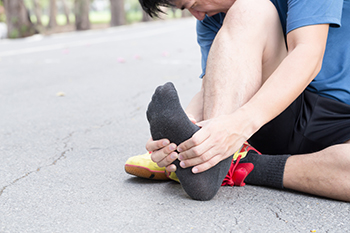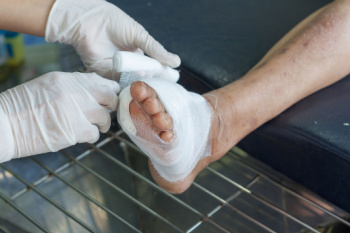
Plantar fasciitis, one of the most common causes of heel pain, occurs when the plantar fascia ligament along the bottom of the foot becomes irritated or inflamed. The heel may look normal or slightly swollen, but the pain is often most noticeable with the first steps in the morning or after periods of rest. It commonly feels sharp, stabbing, or aching at the heel, then may turn into a dull soreness as activity continues. Causes include overuse, tight calf muscles, flat feet or high arches, and unsupportive footwear. A podiatrist can help from the start by performing a thorough examination, reviewing activity history, and confirming the diagnosis with imaging when needed. Treatment often begins with pain and inflammation management, stretching guidance, footwear changes, or orthotics. Care may then progress into targeted exercises or night splints to promote healing and prevent recurrence. If you have ongoing heel pain, it is suggested that you make an appointment with a podiatrist.
Plantar fasciitis is a common foot condition that is often caused by a strain injury. If you are experiencing heel pain or symptoms of plantar fasciitis, contact One of our podiatrists from Diagnostic Foot Specialists. Our doctors can provide the care you need to keep you pain-free and on your feet.
What Is Plantar Fasciitis?
Plantar fasciitis is one of the most common causes of heel pain. The plantar fascia is a ligament that connects your heel to the front of your foot. When this ligament becomes inflamed, plantar fasciitis is the result. If you have plantar fasciitis you will have a stabbing pain that usually occurs with your first steps in the morning. As the day progresses and you walk around more, this pain will start to disappear, but it will return after long periods of standing or sitting.
What Causes Plantar Fasciitis?
- Excessive running
- Having high arches in your feet
- Other foot issues such as flat feet
- Pregnancy (due to the sudden weight gain)
- Being on your feet very often
There are some risk factors that may make you more likely to develop plantar fasciitis compared to others. The condition most commonly affects adults between the ages of 40 and 60. It also tends to affect people who are obese because the extra pounds result in extra stress being placed on the plantar fascia.
Prevention
- Take good care of your feet – Wear shoes that have good arch support and heel cushioning.
- Maintain a healthy weight
- If you are a runner, alternate running with other sports that won’t cause heel pain
There are a variety of treatment options available for plantar fasciitis along with the pain that accompanies it. Additionally, physical therapy is a very important component in the treatment process. It is important that you meet with your podiatrist to determine which treatment option is best for you.
If you have any questions, please feel free to contact our offices located in Houston, TX, Houston, TX, and Bryan, TX . We offer the newest diagnostic and treatment technologies for all your foot care needs.

Diabetes can affect the feet in many ways, often developing slowly and without obvious symptoms, at first. High blood sugar levels can damage nerves, leading to diabetic neuropathy, which causes numbness, tingling, burning, or loss of sensation. When you cannot feel pain or pressure normally, small injuries may go unnoticed and become more serious. Diabetes also affects circulation, reducing blood flow to the feet and making it harder for cuts, blisters, or sores to heal. Dry, cracked skin, thickened nails, calluses, and changes in foot shape can also occur as the disease progresses. One of the most serious complications is the development of foot ulcers, which can become infected, if not treated promptly. Regular foot checks, wearing proper footwear, and early intervention from a podiatrist can help prevent complications and protect long-term foot health. If you have diabetes, it is suggested that you see a podiatrist for foot checks on a regular basis.
Diabetic foot care is important in preventing foot ailments such as ulcers. If you are suffering from diabetes or have any other concerns about your feet, contact One of our podiatrists from Diagnostic Foot Specialists. Our doctors can provide the care you need to keep you pain-free and on your feet.
Diabetic Foot Care
Diabetes affects millions of people every year. The condition can damage blood vessels in many parts of the body, especially the feet. Because of this, taking care of your feet is essential if you have diabetes, and having a podiatrist help monitor your foot health is highly recommended.
The Importance of Caring for Your Feet
- Routinely inspect your feet for bruises or sores.
- Wear socks that fit your feet comfortably.
- Wear comfortable shoes that provide adequate support.
Patients with diabetes should have their doctor monitor their blood levels, as blood sugar levels play such a huge role in diabetic care. Monitoring these levels on a regular basis is highly advised.
It is always best to inform your healthcare professional of any concerns you may have regarding your feet, especially for diabetic patients. Early treatment and routine foot examinations are keys to maintaining proper health, especially because severe complications can arise if proper treatment is not applied.
If you have any questions, please feel free to contact our offices located in Houston, TX, Houston, TX, and Bryan, TX . We offer the newest diagnostic and treatment technologies for all your foot care needs.

Selecting the right running shoes is essential for comfort, performance, and injury prevention. Key considerations include a minimal heel-to-toe drop, which promotes natural foot movement, and adequate cushioning to absorb impact and reduce stress on joints. Proper fit and support help prevent common issues like plantar fasciitis, shin splints, and blisters. It is important to consider individual foot structure, gait, and running style when making a selection. A podiatrist can evaluate your feet, analyze your running mechanics, and recommend shoes or custom orthotics that provide optimal support and alignment. If you have injured your foot or ankle while running, it is suggested that you consult a podiatrist who can treat various foot and ankle conditions.
You should always make sure your running shoes fit properly in order to avoid injury. For more information, contact One of our podiatrists from Diagnostic Foot Specialists. Our doctors can provide the care you need to keep you pain-free and on your feet.
Choosing the Right Running Shoe for Your Foot Type
Improper shoe sizing can cause a myriad of problems for your feet. Shoes that don’t fit you properly can lead to muscular imbalances in your body, which can result in foot, knee, and hip injuries.
Tips for Finding the Right Running Shoe
- Make sure you have a thumb’s width of wiggle room between the end of your longest toe and the front of the shoe.
- There should be little to no slipping at the heel
- Don’t assume your size in one shoe brand will be your size in another
- Do not lace up your shoes too tightly
- Walk around in the store with your new shoes before you buy them
If you have any questions, please feel free to contact our offices located in Houston, TX, Houston, TX, and Bryan, TX . We offer the newest diagnostic and treatment technologies for all your foot care needs.

